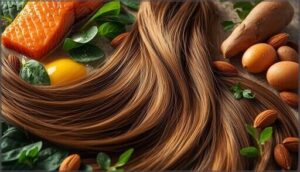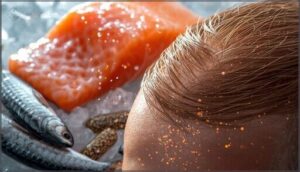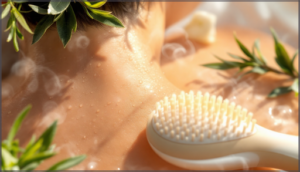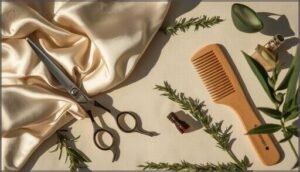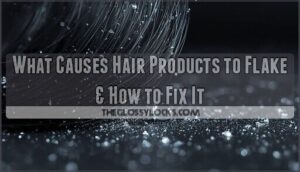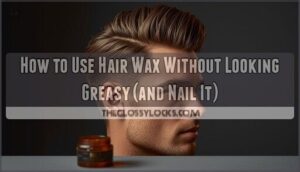This site is supported by our readers. We may earn a commission, at no cost to you, if you purchase through links.
Your hair follicles are microscopic battlegrounds where genetics, hormones, and cellular biology wage a daily war that determines whether your hair thrives or withers. Most people blame genetics alone when their hair grows slowly or thins prematurely, but research reveals that your daily choices—what you eat, how you treat your scalp, and which products you use—can override inherited disadvantages.
Hair follicles respond to specific nutritional signals, mechanical stimulation, and inflammatory markers in ways that either accelerate or stall growth at the cellular level. Understanding what encourages hair growth means moving beyond hair care marketing myths and focusing on evidence-based interventions that target the anagen phase, improve follicle health, and reduce factors that trigger premature shedding.
Table Of Contents
- Key Takeaways
- What Encourages Hair Growth?
- Nutrition That Promotes Hair Growth
- Scalp Care for Optimal Hair Growth
- Healthy Hair Care Practices
- Supplements and Treatments for Hair Growth
- Frequently Asked Questions (FAQs)
- How can I increase my hair growth and thickness?
- How can I improve my hair growth?
- What foods are beneficial for hair growth?
- How can a healthy scalp improve hair growth?
- How to stimulate hair growth at home?
- Does hair care really boost hair growth?
- What supplements help with hair growth?
- How can I encourage my hair to grow?
- What triggers hair growth?
- Is there anything that stimulates hair growth?
- Conclusion
Key Takeaways
- Your hair growth responds to controllable lifestyle factors like nutrition, scalp care, and stress management—not just genetics—meaning targeted interventions can override inherited disadvantages and extend the active growth phase.
- Essential nutrients, including iron, zinc, biotin, omega-3 fatty acids, and complete proteins, directly fuel keratin production and follicle health, while deficiencies in any of these minerals trigger measurable thinning and shedding.
- Scalp health practices like regular massage (boosting blood circulation), gentle exfoliation (removing follicle-clogging debris), and moisture maintenance create the foundation for stronger growth and reduced breakage.
- Evidence-based treatments, ranging from topical minoxidil and professional microneedling to protective hairstyles and heat reduction, deliver measurable results when applied consistently over three to six months.
What Encourages Hair Growth?
Your hair doesn’t grow in a vacuum—it reacts to a complex mix of biological factors you can’t always control and lifestyle choices you absolutely can.
Stress, poor nutrition, and certain medical conditions can all stunt your hair’s natural growth cycle, which is why understanding the triggers matters.
Hair growth responds to biological factors beyond your control and lifestyle choices you can absolutely influence
Understanding what drives growth (and what slows it down) puts you in the driver’s seat in maximizing your hair’s potential.
Let’s break down the science behind what makes hair grow, starting with the fundamentals you need to know.
Role of Genetics and Age
Your genetic blueprint sets the stage for hair growth, even though you can’t rewrite your DNA. Twin studies reveal heredity accounts for differences in lifespan and aging pace, while specific gene variants affect how quickly cells age through telomere shortening and epigenetic changes.
Key genetic factors influencing your hair:
- Hormone interactions with IGF-1 pathways modulate tissue repair across your lifespan
- Telomere length determines cellular aging speed and senescence timing
- Epigenetic aging patterns alter gene expression without changing your DNA sequence
Hair Growth Cycle Explained
Your hair follicles cycle through four growth phases—anagen, catagen, telogen, and exogen—that determine hair length and density.
The anagen phase drives active growth for several years, while catagen marks a brief pause.
During telogen, your hair rests before hair shedding occurs in exogen.
Understanding this hair growth cycle helps you target scalp health strategies that support hair regrowth and refine cycle timing. For more detailed information about the different stages, learn more about the full hair growth cycle.
Common Causes of Slow Hair Growth
Several factors can derail hair growth promotion. Hormonal imbalance—from thyroid disorders to PCOS—shortens your active growth phase.
Nutrient deficiency in iron or biotin slows keratin production, while scalp inflammation from dandruff disrupts follicle activity.
Telogen effluvium triggered by stress pushes follicles into early shedding. Medical conditions like autoimmune alopecia and certain medications further compound hair loss, demanding targeted scalp health interventions.
For more details on the stages and causes of hair loss, see this resource on the hair growth cycle breakdown.
Nutrition That Promotes Hair Growth
Your diet directly influences how well your hair grows—and what you eat can either support or sabotage your hair growth. Think of nutrition as the foundation for stronger, healthier strands, not just a passive background factor.
Here’s what you need to fuel hair growth from the inside out.
Pair these internal nutrients with natural volume-boosting techniques to maximize hair thickness and fullness from root to tip.
Essential Vitamins and Minerals for Hair
You can’t fuel follicle activity without the right vitamin balance—and deficiencies show up fast as thinning or shedding. Your hair follicle depends on Vitamin A for scalp health, Vitamin D to regulate cycling, and biotin to build keratin.
Iron delivers oxygen, zinc structures each strand, and omega-3 fatty acids calm inflammation. When nutrient absorption falters, hair growth stalls—so nutrition matters more than most realize.
Protein-Rich Foods for Stronger Hair
Complete protein sources deliver amino acids your follicles can’t make themselves—that’s where dietary needs meet hair nutrition directly. You need variety to cover the spectrum of amino acids that build strong keratin shafts.
- Eggs supply high-quality protein with choline, fueling follicle health and keratin production
- Lean poultry like chicken provides complete protein and B vitamins for shaft strength
- Salmon and mackerel combine protein with omega-3s, nourishing your scalp and boosting shine
These protein-rich foods form the foundation of healthy eating for hair health.
Importance of Iron, Zinc, and Biotin
Deficiency in any one of these minerals can sabotage your growth goals. Iron transports oxygen to follicles through hemoglobin, zinc regulates keratin synthesis and scalp immunity, and biotin strengthens hair infrastructure by supporting fatty acid production. Mineral balance matters—excess zinc blocks copper absorption, while vitamin C boosts iron deficiency recovery.
| Mineral | Primary Hair Function |
|---|---|
| Iron | Oxygen delivery to follicle cells via red blood cells |
| Zinc | Keratin protein synthesis and scalp immune regulation |
| Biotin | Fatty acid production fueling follicle cell growth |
Pair iron-rich beef with citrus for nutrient absorption, add zinc supplements cautiously, and recognize biotin benefits extend beyond marketing hype—these vitamins and nutrition fundamentals build resilient strands from the inside out.
Omega-3 Fatty Acids and Scalp Health
Your scalp craves omega-3 fatty acids—EPA and DHA from salmon, mackerel, and sardines calm inflammation that triggers dandruff and follicle disruption. These fats stabilize cell membranes, boost nutrient delivery, and extend the anagen growth phase by maintaining sebum balance.
Plant sources like flaxseeds offer ALA, though fish provides direct scalp health maintenance. Aim for 250–1,000 mg daily to fortify follicle environments and reduce shedding.
Foods to Avoid for Healthy Hair
Your dietary choices shape hair growth—what you skip matters as much as what you eat. Refined carbs and fried items flood your scalp with inflammation that chokes follicles and weakens keratin bonds.
Hair Growth Saboteurs:
- Sugar Impact: Excess desserts spike androgens, shrinking follicles while displacing nutrient-rich foods.
- Saturated Fats: Fried items clog pores, reducing oxygen flow to roots.
- Processed Foods: Trans fats impair blood delivery, starving hair cells.
- Alcohol: Heavy drinking depletes zinc and B vitamins essential for shaft strength.
Scalp Care for Optimal Hair Growth
Your scalp is the foundation where every strand of hair begins its growth cycle, and maintaining its health directly impacts the quality and rate of hair growth.
Beyond washing your hair, you’ll need to address factors like circulation, product buildup, inflammation, and moisture balance to create a favorable environment for follicles. The following evidence-based strategies will help you establish a thorough scalp care routine that promotes stronger, healthier hair growth.
Benefits of Regular Scalp Massage
Think of regular scalp massage as reclaiming control over your hair’s foundation—you’re boosting blood circulation directly to hair follicles, delivering oxygen and nutrients that fuel stronger growth.
This simple relaxation therapy technique reduces stress hormones that disrupt your hair cycle while improving product absorption for better scalp care. Consistent massage techniques support follicle stimulation and can extend the active growth phase, giving you real hair regrowth strategies that work.
Choosing The Right Shampoo and Conditioner
You’re overthrowing bad hair days by filtering shampoos labeled for your hair type first—that’s how you seize control over scalp health.
Fine or oily hair thrives with lightweight formulas, while curly textures demand moisturizing shampoos that fight frizz.
Pair with gentle conditioners that strengthen without weighing down strands, and you’ll discover the hair care foundation your follicles actually need for consistent hair growth.
Scalp Exfoliation and Dandruff Control
Regular scalp exfoliation dislodges dead skin cells and excess oil that fuel Malassezia fungi—one of the primary dandruff causes. You’ll find physical scrubs with fine beads effective for flake removal, while chemical exfoliants containing salicylic acid dissolve buildup without harsh friction.
Pair these exfoliant types with antidandruff treatment shampoos once or twice weekly to break the cycle of irritation and reclaim scalp health through strategic hair care.
Maintaining Moisture and Reducing Inflammation
Once you’ve cleared flakes, lock in scalp hydration through pH-balanced cleansers and niacinamide-enriched conditioners that repair your scalp barrier.
Drink eight cups of water daily and load up on omega-3 fatty acids plus vitamin E to control inflammation from within. Four-minute scalp massages boost circulation, delivering moisture to hair follicles while improving nutrition distribution—your foundation for resilient follicle health and breakage-free growth.
Healthy Hair Care Practices
Your daily habits can either accelerate growth or sabotage your progress before you even notice the damage.
Small shifts in how you treat your hair—from the scissors you use to the pillowcase you sleep on—directly influence follicle health and breakage rates. Here’s what you need to change to keep every strand intact and growing.
Trimming and Breakage Prevention
Cutting away damaged ends every 6 to 8 weeks prevents split end repair from becoming your nemesis—those frayed tips travel upward, sabotaging hair thickness and hair growth.
Breakage prevention demands sharp tools and strategic handling:
- Detangle gently from ends to roots using a wide-tooth comb
- Shield ends with leave-in conditioners for hair strengthening
- Choose protective styles like loose braids to reduce hair breakage
Smart hair trimming and frizz reduction techniques put you in control of your hair care destiny.
Limiting Heat Styling and Chemical Treatments
Heat styling and chemical treatments weaken your hair shaft, choking hair growth potential—ceramic or tourmaline tools cut heat transfer by up to 40 percent.
Dial down temperatures, use heat protection sprays, and space chemical services 8 to 12 weeks apart to dodge breakage.
Air-dry techniques and styling alternatives free you from heat damage while damage repair conditioners with ceramides seal cuticles and restore moisture.
Protective Hairstyles and Nighttime Care
Satin pillowcases slash friction by 20 percent, shielding strands from overnight damage—braided styles and loose updos distribute tension evenly while protecting hair ends.
Apply lightweight leave-in conditioner to lock in nighttime hydration, then follow with scalp massages for 2–4 minutes to boost microcirculation. These hair care tips maintain scalp health and fuel hair growth while you sleep.
Importance of Hydration for Hair Growth
Adequate water intake fuels hair growth by transporting nutrients to follicles and maintaining scalp health—aim for 64 ounces daily to support fluid balance.
Hydration benefits include improved hair elasticity, reduced breakage, and enhanced blood flow to roots.
Combine proper hydration with nutrition and hair growth essentials to optimize follicle function and maintain the importance of hydration for hair throughout your growth cycle.
Supplements and Treatments for Hair Growth
When healthy habits aren’t enough to combat hair loss, targeted supplements and medical treatments can make a real difference.
You have options ranging from over-the-counter vitamins to prescription medications and professional procedures that directly stimulate your follicles.
Here’s what actually works, when to use it, and how to know if you need expert help.
Popular Vitamins and Supplements (Biotin, Vitamin D, Iron)
Think of vitamins and nutritional supplements as your hair’s backup power source when diet alone falls short. Biotin benefits nail strength more reliably than hair growth, though deficiency causes thinning.
Vitamin D role in follicle cycling matters—low levels correlate with shedding. Iron deficiency triggers diffuse hair loss, especially in women, but iron supplement safety requires medical guidance since excess causes organ damage.
Topical Treatments (Minoxidil, Essential Oils)
Topical solutions like minoxidil deliver measurable hair regrowth results, while essential oils remain experimental. Minoxidil expands scalp blood vessels and nudges follicles into growth phase—expect visible changes after three to six months of daily use. Essential oils such as peppermint oil may boost circulation when properly diluted, though evidence stays limited compared to FDA-approved options.
- Minoxidil comes in 2% and 5% strengths for targeted follicle stimulation
- Foam formulations reduce scalp irritation compared to propylene glycol solutions
- Peppermint oil requires carrier dilution to prevent skin reactions
- Results demand consistency—skipping applications stalls progress
- Patch testing prevents allergic responses before widespread scalp treatment
Professional Procedures (Microneedling, Light Therapy)
Microneedling disrupts the scalp’s comfort zone with controlled micro-injuries that trigger collagen production and boost hair follicle activity. Depths range from 0.25 to 2.5 millimeters depending on your scalp thickness and treatment goals.
PRP integration amplifies growth factor delivery during typical four-to-six-session protocols. Light therapy uses red wavelengths around 630 to 670 nanometers to energize follicle cells—expect 10-to-20-minute sessions twice weekly.
Safety protocols demand sterile technique and proper screening for bleeding disorders.
When to Seek Medical Advice for Hair Loss
Sudden patches or persistent shedding beyond three months demands a medical evaluation—your scalp won’t fix itself when underlying triggers persist. Watch for these urgent care signs:
- Fever with scalp pain or pus-filled lesions
- Widespread hair loss with fatigue or weight changes
- Red, scaly patches unresponsive to over-the-counter treatments
- Shedding exceeding 100 hairs daily for weeks
- Family history plus rapid temple thinning
A dermatologist referral unlocks scalp condition diagnosis and targeted interventions—from minoxidil protocols to trichology workups—that over-the-counter hair loss prevention can’t address.
Frequently Asked Questions (FAQs)
How can I increase my hair growth and thickness?
You can boost Hair Growth and Hair Thickness through Growth Cycle Optimization: prioritize protein-rich Nutrition and Hair Growth with targeted Vitamins, perform Scalp Stimulation through massage, and maintain Follicle Health using Thickening Techniques like minoxidil and protective Hair Growth Tips.
How can I improve my hair growth?
Transform your hair growth by nourishing follicles with iron, zinc, and biotin—these nutrients power your hair growth cycle, boost scalp health, and tackle nutrient deficiency to reveal thicker, stronger strands through targeted supplement use.
What foods are beneficial for hair growth?
Your plate is the secret weapon. Load up on protein-rich foods like salmon and eggs, iron-rich spinach, biotin foods such as almonds, and omega-3 fatty acids from walnuts to fuel stronger strands.
How can a healthy scalp improve hair growth?
Think of your scalp as the soil where hair thrives.
Proper scalp hygiene removes follicle-clogging debris, while scalp massage increases blood flow, delivering nutrients that fuel the hair growth cycle and support microbiome balance for ideal scalp health.
How to stimulate hair growth at home?
You can boost hair growth at home through daily scalp massage to increase blood flow, targeted DIY masks with protein-rich ingredients, smart shampoo selection for your hair type, and consistent supplement use after medical guidance.
Does hair care really boost hair growth?
Studies show that about 40% of women experience visible hair loss by age
Your daily hair routine matters—gentle hair products, scalp health practices, and understanding hair growth stages help minimize breakage and support retention.
What supplements help with hair growth?
Biotin, Vitamin D, iron, and omega-3 fatty acids are the most evidence-backed hair growth pills.
These vitamin supplements address common deficiencies linked to thinning—but correcting iron deficiency and low biotin yields the strongest clinical results.
How can I encourage my hair to grow?
Want your locks to reach their full potential? You can encourage hair growth by nourishing hair follicles with protein-rich foods, omega-3 fatty acids, essential vitamins, and scalp health practices that support your natural growth cycle.
What triggers hair growth?
Hair follicles activate during the anagen growth phase when nutrient uptake, hormone balance, and cellular regeneration align properly.
Follicle stimulation depends on adequate blood flow delivering oxygen and essential minerals to support the hair growth cycle.
Is there anything that stimulates hair growth?
Yes—minoxidil directly stimulates follicles, while scalp massage boosts circulation and microneedling triggers growth factors.
Balanced hormone levels, nutrient absorption, and understanding hair growth cycle phases all support follicle stimulation naturally.
Conclusion
Your hair follicles aren’t passive bystanders—they’re active responders to the biochemical signals you send every day through diet, scalp care, and lifestyle choices.
While you can’t rewrite your genetic code, you can absolutely influence what encourages hair growth by addressing nutritional deficiencies, reducing inflammation, and protecting follicles from mechanical damage.
The science is clear: consistent, evidence-based interventions shift the odds in your favor, giving you measurable control over your hair’s health trajectory.


